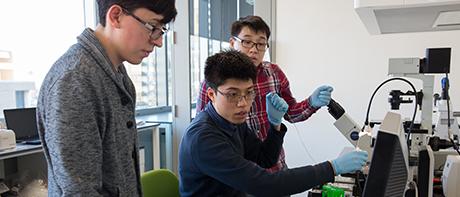Biomedical Engineering
Program Overview
Offered through the Department of Biomedical Engineering, the M.S. and Ph.D. programs in Biomedical Engineering are designed to prepare students to apply engineering principles to problems in medicine and biology; to understand and model attributes of living systems; and to synthesize biomedical systems and devices.
The program is strongly interdisciplinary, as students choose from a large array of areas of study across the university. The core faculty expertise includes cancer therapy, cardiac electrophysiology, biosensors, microfluidics, medical imaging and image analysis, optogenetics, robotics, and ultrasound applications in medicine.
Both the M.S. and Ph.D. programs are based on the main campus in Foggy Bottom, taking full advantage of the close proximity to the School of Medicine, the Milken Institute School of Public Health, and the GW Hospital. These interactions are supplemented by collaborations with nearby clinical and research facilities, including Children’s National Health System and federal agencies such as the Food and Drug Administration (FDA) and the National Institutes of Health (NIH).
Interested in the regulatory side of biomedical engineering? Check out the master's program in Regulatory Biomedical Engineering.
Master of Science in Biomedical Engineering (M.S.)
- Credit hours: 30
- Duration: Two years (full-time or 9 credit hours/semester) or three years (part-time or 3 credit hours/semester)
- Thesis options: Two - Students who choose to complete a thesis take 24 credit hours of course work and 6 credit hours for conducting thesis research. These 6 credit hours must be taken over two terms. Students who choose the non-thesis option take 30 credit hours of course work
- Other requirements:
- Colloquium requirement: Students must attend five seminars, workshops, or symposia sponsored by the department in order to fulfill this zero-credit requirement.
- More Information on the department's website
Doctor of Philosophy in Biomedical Engineering (Ph.D.)
- Credit hours (for those with a master's degree): 30
- Credit hours (for those without a master's degree): 54
- Duration: 5-6 years
- Other requirements:
- Qualifying examination: Prior to completing 18 credit hours, students must take a qualifying examination to assess their readiness in conducting extensive independent research. Students must have cumulative GPA of at least 3.4 in order to be admitted to take the exam.
- Colloquium requirement: Students must attend five seminars, workshops, or symposia sponsored by the department in order to fulfill this zero-credit requirement.
- More Information on the department's website
Admissions Requirements
To apply, please review the admissions requirements for the degree type before submitting your application:
For any questions about the admissions process, contact the SEAS Office of Graduate Admissions at [email protected].
More Information
For more information on graduate programs in Biomedical Engineering, sign up to receive emails with more information or visit the website of the Department of Biomedical Engineering.


